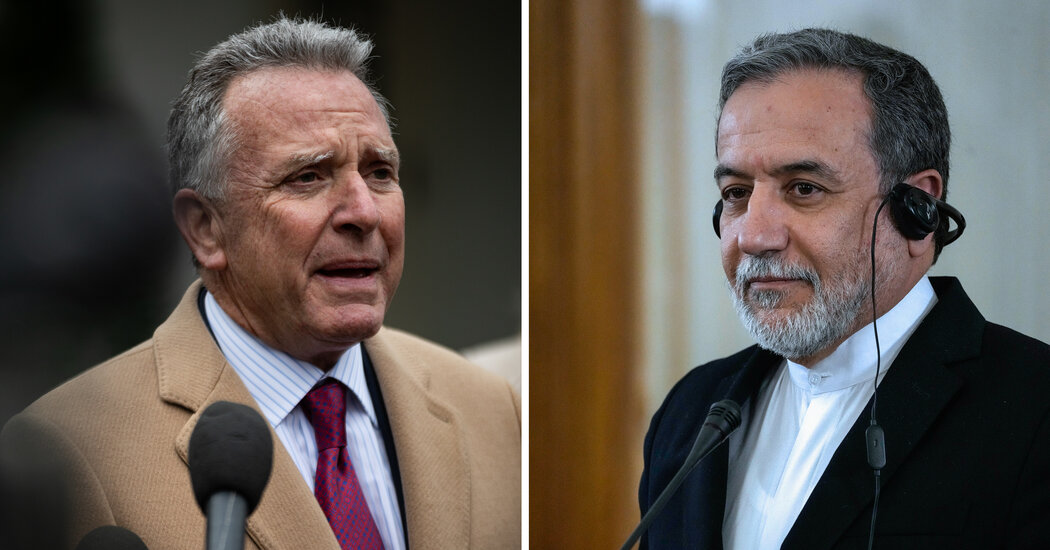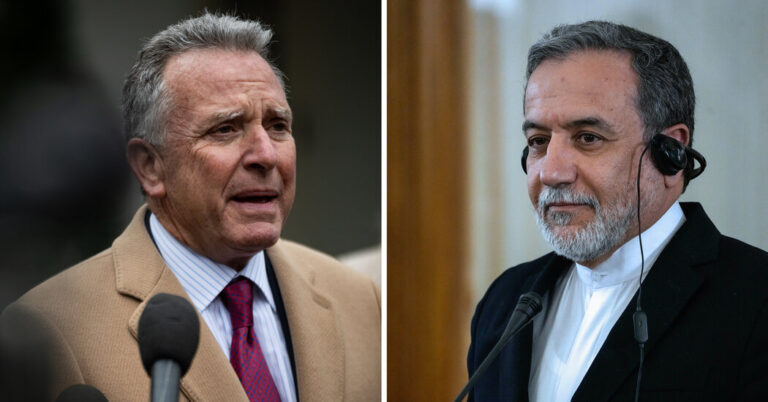The first meeting between the United States and Iran for his expanding nuclear program on Saturday showed a seriousness of purpose and an effort to avoid what neither of them wants, another war in the Middle East. They will speak again next Saturday, but hard work awaits us, as is expected that the tail courses in both countries and Israel will match the maximum.
If the first nuclear agreement, reached in 2015, was pushed by Iran’s desire to get rid of punishing economic sanctions, these interviews have more urgently. Iran, mistreated by Israel and with its regional delegates decreases, still wants economic relief. But he also understands that the Islamic Republic itself is threatened and that President Trump, who retired from the first agreement because he thought he was too weak, may not be bluffing on facing Iran “bombing artists of the caliber they never saw before”.
And the Iranian supreme leader, Ayatollah Ali Khamenei, gave his negotiators at least one last chance to exchange the nuclear ambitions of Iran for lasting safety.
The talks in Oman also promised some efficiency. The 2015 agreement was concluded between Iran and six countries – the five permanent members of the United Nations Security Council plus Germany, with the European Union that plays the role of the Intermediary – and required two years.
This time the interviews are bilateral, with the Europeans but also Russia and China on the sidelines. And although the United States remain “the great Satan” for Ayatollah Khamenei, it also holds the key to holding Israel and guaranteeing any lasting agreement. While Iran insisted on the indirect interviews through Oman and Mr. Trump on direct interviews, the two sides managed to confuse the problem, with the special correspondent of Mr. Trump, Steve Witkoff, speaking directly with the Iranian Foreign Minister, Abbas Araghchi, while the meeting ended.
“This is a good start,” said Ali Vaez, director of the Iranian project for the international crisis group. “They could have stumbled, but they agreed to meet again, they met at the end and agreed the final goal.”
It is important to emphasize that Mr. Trump and Witkoff have indicated that their true background line is ensuring that Iran can never build a nuclear weapon – despite the harsh requests from Trump’s officials before the interviews that Iran dismantles its nuclear program completely and abandoning its missile program and its support for its regional proxy.
Iran had clarified that so large requests would leave defenseless and could put an end to the talks before they started. So by limiting the goal of ensuring that Iran can never build a nuclear bomb, if the administration attacks, it abruptly improves the chances of success of the interviews.
“The Iranians came prepared for more than one breaker, but with the expectation to break Logjam with the United States and, above all, listen directly to what is the real profit of the United States,” said Vali Nasr, professor at Johns Hopkins School of Advanced International Studies. “If it is not a weapon, then they can negotiate to enrichment levels, inspections and so on. But Iran does not want to enter a situation in which he cannot offer and risk more penalties and war,” he said. “What Iran wants is quite clear: relief of credible sanctions and an agreement that attacks.”
Iran insists that its nuclear program is exclusively civil, but has enriched enough uranium close to the level quality of the weapons to be created at least six bombs, according to the data of the International Agency for atomic energy, which implements the treatise of nuclear non -proliferation that Iran has signed.
Despite their distrust of Mr. Trump, the Iranians think that it would be better able to guarantee the sustainability of an agreement that makes and deals with his republican streams, said Nasr. The Iranians have never trusted President Joseph R. Biden Jr. “to follow and avoid being undermined by the congress,” he said.
“We are in the best place that we could stay after this meeting,” said Sanam Vakil, director of the Middle East and North Africa program in Chatham House. There were positive statements from both sides around a plan to move forward, he said, and “a mutual understanding on the urgency required, the opportunity presented and signs of pragmatism on both sides”.
He added, “Of course, difficult things are in front of it.”
A serious agreement will be enormously complicated and technical and it will take some time. He would also need to survive the efforts to undermine talks from the tail courses in both countries and in Israel. Israel, who opposed the 2015 agreement, wants a more complete disarmament than Iran and continues to talk about the need to hit him militarily now, when the regime is weak and his aerial defenses were seriously compromised by Israeli air attacks.
In the past Iran has promised to destroy Israel and Prime Minister Benjamin Netanyahu by Israel claims to want Iran to be no longer able to enrich any uranium. Israel, citing Hamas’s attack in Gaza, seriously damaged Iranian prosecutors, including Hamas and Hezbollah in Lebanon and wants to try to guarantee that Iran cannot reconstruct them.
But Iran could also be encouraged by the fact that Mr. Trump announced the talks in the oval office next to Mr. Netanyahu, who did not seem or seemed very happy with them. Iran will see “a powerful Trump signal that is not owned by Netanyahu,” said Nasr.
The hope is that a next meeting or two can produce a provisional agreement that gives both sides the trust to go on, with short -term measures from both sides as long as the talks continue. They could include Iran by agreeing to freeze the enrichment of uranium and allow further inspections in exchange for the suspension of Washington some of its “maximum pressure” sanctions.
Iran is likely to insisted on a step-by-step process that could take several years, Mr. Nasr said: “To help the roots grow before someone else enters office and tried to cancel it”. A longer process would also provide greater safety for Iran.
However, Iran has no reason to lengthen the talks themselves. “Iran leverage is its nuclear enrichment and more time will not give them greater leverage,” said Vaez. And then there is “the clockwork bomb of the Snapback penalties”.
These sanctions, suspended pursuant to the 2015 agreement, can be restored if a signatory – in this case, the Europeans – decides that there is no new agreement or significant progress towards one. But this must happen before October 18, when the “Snap Back” ability expires. Officials affirm that Europeans are exploring if this deadline can be delayed, but the mechanism to do so is not clear.
In any case, analysts agree, Iran does not want to be blamed for the failure of these interviews. If they fail and follow the war, the regime wants to be able to blame American perfidy and bad faith.
So if an agreement can be made, Iran will want to guarantee that this time it will be durable and will provide a commercial commitment in a significant and long -term way, said Mrs. Vakil. Iran will want to know “as Trump can guarantee the protection that other presidents have not been able to do”.
And the United States, he said, will want to know what Iran guarantees that Iran can provide for the safety of Israel and the stability of the largest Middle East.
“An agreement must be mutually advantageous, but requires a lot of trust and responsibility along the road that both sides simply do not have at this moment,” he said.





